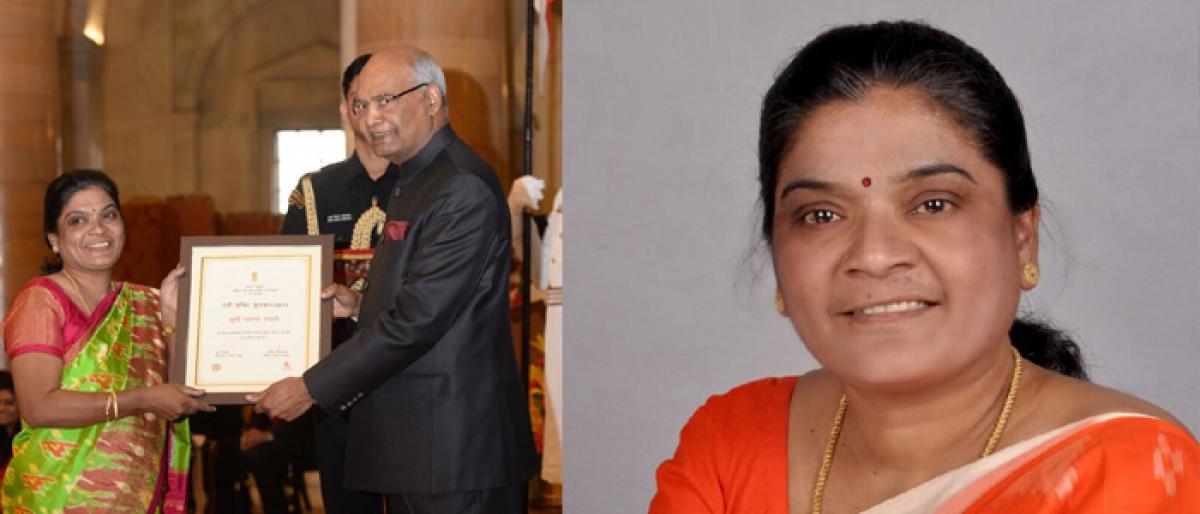Live
- ‘Rathnam’ review: A worthy addition to Vishal’s filmography
- Covid-19 worsened 'silent' spread of antimicrobial resistance: WHO
- SP Gaikwad Vaibhav Raghunath congratulated the inter state ranker
- Several killed and injured after junta airstrikes in Myanmar
- Did Shruti Haasan and Shantanu Call it Quits?
- Catch GV Prakash Kumar’s ‘Dear’ on OTT from April 28th
- Encounter In Sopore: Two Lashkar Terrorists Killed, Two Army Jawans Injured
- INDIA bloc aims to divide the country on religious grounds: UP CM Yogi Adityanath
- Fire Breaks Out at Alwyn Pharmacy Company in Shadnagar
- PM Modi Slams SP-Congress Alliance, Alleges Politics Of Appeasement
Just In

Discrimination and dejection was all she knew, until she braved the darkness and evolved to be the voice of those who were rejected by the society. Jayamma Bandari defied norms against all odds and founded Chaitanya Mahila Mandaliin 1993 and in 2001 began working for the betterment of sex workers and their children.
Sex worker-turned social worker, Jayamma Bandari bags ‘Nari Shakti Puraskar award-2017’
Discrimination and dejection was all she knew, until she braved the darkness and evolved to be the voice of those who were rejected by the society. Jayamma Bandari defied norms against all odds and founded Chaitanya Mahila Mandaliin 1993 and in 2001 began working for the betterment of sex workers and their children.
She was recently conferred the ‘Nari Shakti Puraskar Award-2017’ on the occasion of International Women’s Day by the Government of India. Speaking to The Hans India, Jayamma said, “I am thankful to receive the award. But there is lot more work to be done to safe guard the lives of sex workers. I only desire that the government will acknowledge the presence of the sex workers in the community and come to their rescue”
Jayamma was accustomed to harassment by her husband who forced her into flesh trade. Circumstances left her in the lurch, but she tried to get out. She continued sex work for six months before she started the organisation to help those who were rejected by the society.
She said most women are sold into the sex trade by family members or husbands. Often, small town girls come to metro cities searching for a better life and get duped into sex work. Once initiated, they are trapped by their sense of shame. Most are uneducated with very little exposure, making them easy targets for predators.
Taking cue from her own story, she spreads awareness on trafficking and other inhumane activities. She aims to create empathy for sex workers by establishing them as victims instead of criminals. She said the police blindly spread the perception that sex workers are criminals in the society and added that instead of focusing on the plight of sex workers, the police behave rudely with them.
Jayamma said, “The arrested women are thrown into jail where they are frequently brutalised by the authorities who know that they have little awareness of their rights. In fact, most women do not even have the capacity to see themselves as victims.They are projected as “immoral trash” with no rights.”
She did not hesitate to come out in public, share her story and journey. She was one of the first women to show her real identity on television. She is tireless in her campaign to remove stereotypes surrounding sex workers and humanising them for the public.
She also runs a home for the children of sex workers. As many as 45 children are looked after. The home ensures that these children are extricated from high risk environments, given access to high quality education and standards of living, and given a chance at happy and productive lives.
Through her advocacy-based approach to assisting women in sex work and her focus on second generation high risk children, Jayamma is transforming the lives of a severely marginalised and ostracised community.
There is little attention given to unique needs of these children as there is limited understanding of their circumstances. From a very young age, they have been exposed to watching a parent involved in sex work, not taught about sexual health or sexual rights and are easy targets to lure and force into the trade.
She said that her goal is to prevent second generation victimisation of children of sex workers. The Chaitanya Happy Home tries to replicate a regular family home. Children enjoy extra-curricular activities, attend school, take subject coaching, learn life skills like spoken English and Computers.
There are regular health check-ups and counselling sessions. It is an environment that encourages children to believe in themselves and in very different futures from their mothers. Jayamma urged the government to adopt this model and replicate it all over the state and country.
By: Sheker Shivarathri

© 2024 Hyderabad Media House Limited/The Hans India. All rights reserved. Powered by hocalwire.com







